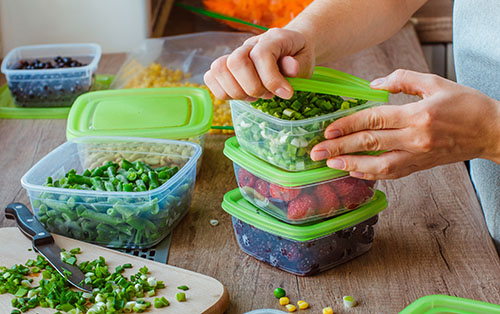Preserve the Freshness
Sep 06, 2022

Fresh fruits and vegetables are an important part of a healthy diet. They are not only a great source of vitamins and minerals, but they have also been known to lower blood pressure, alleviate digestive problems, reduce the risk of heart disease and stroke, and prevent some types of cancer.
However, keeping your carrots crunchy and lettuce crisp can be a real challenge. Follow these helpful tips to preserve your produce longer and minimize food waste.
Start fresh
Getting the longest storage life out of your produce begins by selecting the freshest fruits and veggies. If you do not grow your own, consider buying from a local farmers market where you can avoid food that has already been sitting on a shelf for several days. Getting your produce from farmers in your community also allows you to familiarize yourself with their growing methods and ask whether it has been exposed to artificial lights, temperature changes, or chemicals that reduce the nutritional content.
Find the right temperature
Although refrigerators offer a chill, they also have a drying effect. Therefore, it is often necessary to store produce in perforated bags or in the crisper drawer to increase relative humidity and optimize freshness. Some fruits, such as apples, should be wrapped in a damp paper towel to keep them from drying out. Leafy greens, on the other hand, should be kept in a sealed container or bag — add a dry paper towel to absorb excess moisture and keep the leaves crisp. There is also a handful of fruits and vegetables that don’t go in the fridge. In the case of potatoes and other root crops, refrigeration will turn their starch to sugar, while tomatoes and tropical fruit such as pineapples can quickly become mushy or mealy. Be careful not to leave them too close to your stove, though, where the heat can damage them.
Consider placement
Some produce — such as apples, bananas, and onions — naturally release ethylene gas, which speeds up the ripening process of ethylene-sensitive food such as leafy greens, broccoli, and potatoes. Whether you refrigerate or not, keep the gas-emitting fruits and veggies away from the ethylene-sensitive ones. For example, do not store your onions and potatoes next to each other in the pantry, and move your bananas away from the fruit bowl on your counter.
Freeze
If your produce reaches peak ripeness before you are ready to eat it, press the pause button by tossing it in the freezer. For the best results, peel and cut it into pieces and freeze in a single layer on a parchment-lined cookie sheet. Once frozen, transfer the pieces into a freezer-safe container or bag for up to three months. Just remember, not everything will maintain the same level of taste and texture once you thaw it out.
Cultivating your fall garden is a great way to have access to fresh fruits and veggies throughout the winter months. Visit your local Co-op for planting supplies and advice to set your growing season up for success.
For more content like this, check out the latest issue of The Cooperator.
However, keeping your carrots crunchy and lettuce crisp can be a real challenge. Follow these helpful tips to preserve your produce longer and minimize food waste.
Start fresh
Getting the longest storage life out of your produce begins by selecting the freshest fruits and veggies. If you do not grow your own, consider buying from a local farmers market where you can avoid food that has already been sitting on a shelf for several days. Getting your produce from farmers in your community also allows you to familiarize yourself with their growing methods and ask whether it has been exposed to artificial lights, temperature changes, or chemicals that reduce the nutritional content.
Find the right temperature
Although refrigerators offer a chill, they also have a drying effect. Therefore, it is often necessary to store produce in perforated bags or in the crisper drawer to increase relative humidity and optimize freshness. Some fruits, such as apples, should be wrapped in a damp paper towel to keep them from drying out. Leafy greens, on the other hand, should be kept in a sealed container or bag — add a dry paper towel to absorb excess moisture and keep the leaves crisp. There is also a handful of fruits and vegetables that don’t go in the fridge. In the case of potatoes and other root crops, refrigeration will turn their starch to sugar, while tomatoes and tropical fruit such as pineapples can quickly become mushy or mealy. Be careful not to leave them too close to your stove, though, where the heat can damage them.
Consider placement
Some produce — such as apples, bananas, and onions — naturally release ethylene gas, which speeds up the ripening process of ethylene-sensitive food such as leafy greens, broccoli, and potatoes. Whether you refrigerate or not, keep the gas-emitting fruits and veggies away from the ethylene-sensitive ones. For example, do not store your onions and potatoes next to each other in the pantry, and move your bananas away from the fruit bowl on your counter.
Freeze
If your produce reaches peak ripeness before you are ready to eat it, press the pause button by tossing it in the freezer. For the best results, peel and cut it into pieces and freeze in a single layer on a parchment-lined cookie sheet. Once frozen, transfer the pieces into a freezer-safe container or bag for up to three months. Just remember, not everything will maintain the same level of taste and texture once you thaw it out.
Cultivating your fall garden is a great way to have access to fresh fruits and veggies throughout the winter months. Visit your local Co-op for planting supplies and advice to set your growing season up for success.
For more content like this, check out the latest issue of The Cooperator.